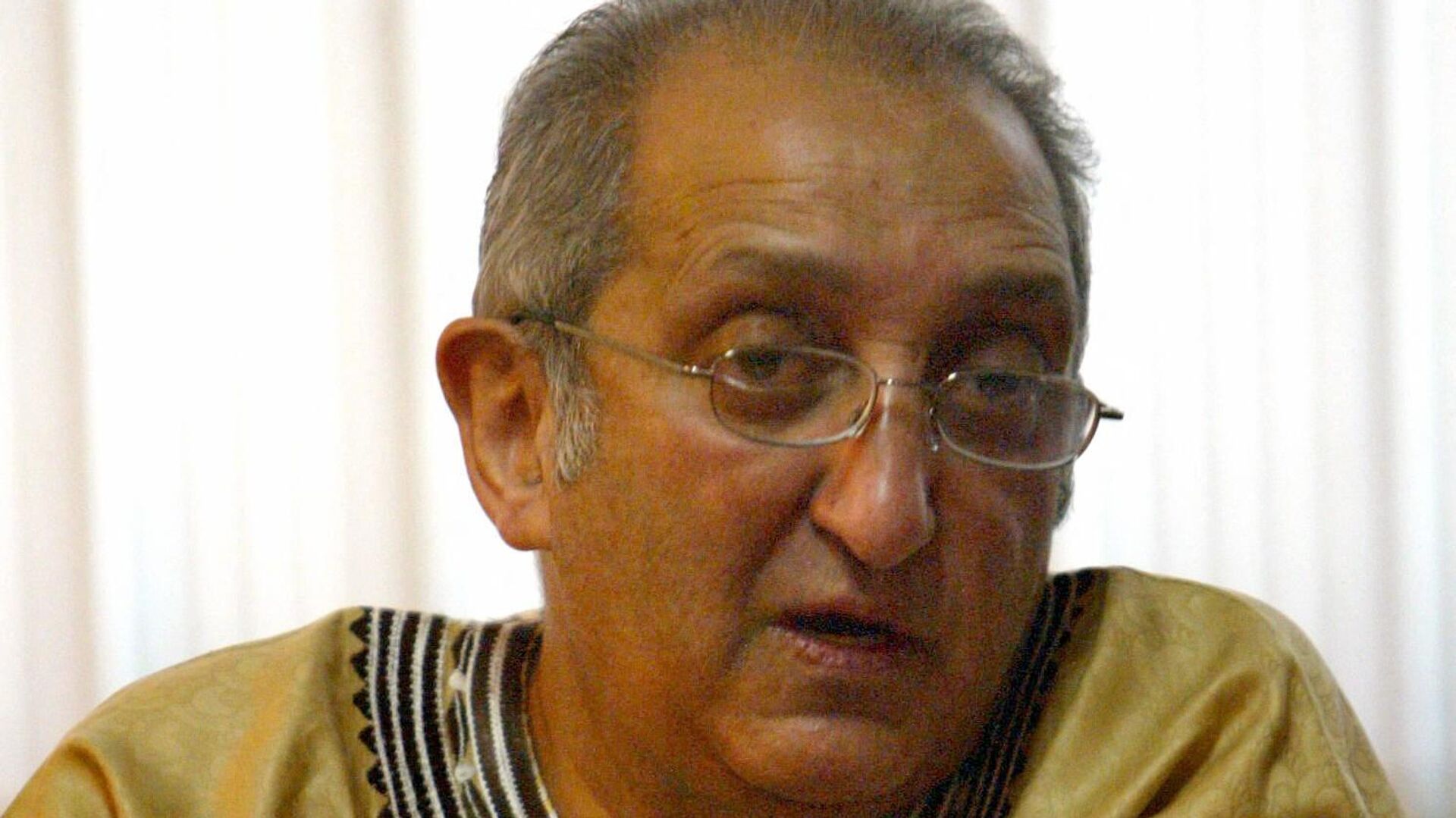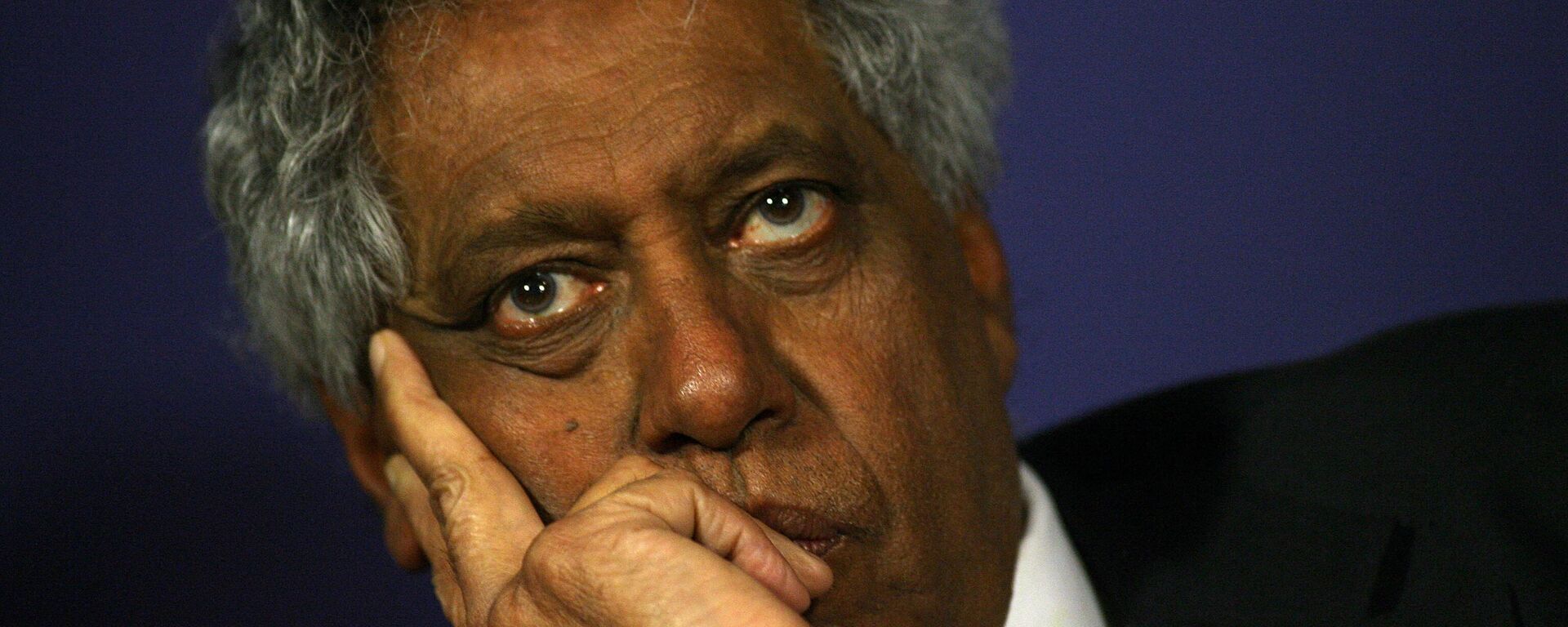https://en.sputniknews.africa/20230928/south-african-anti-apartheid-activist-aziz-pahad-dies-at-age-of-82-1062416787.html
South African Anti-Apartheid Activist Aziz Pahad Dies at Age of 82
South African Anti-Apartheid Activist Aziz Pahad Dies at Age of 82
Sputnik Africa
South African renowned fighter against the apartheid regime Aziz Pahad was a member of the National Executive Committee of the country's ruling party African... 28.09.2023, Sputnik Africa
2023-09-28T15:48+0200
2023-09-28T15:48+0200
2023-09-28T15:48+0200
features
nelson mandela
south africa
johannesburg
united kingdom (uk)
african national congress (anc)
apartheid
anti-apartheid struggle
activism
death
https://cdn1.img.sputniknews.africa/img/07e7/09/1c/1062417211_0:120:1494:960_1920x0_80_0_0_d563b1846e3c691d38ca7549c21088cd.jpg
South African anti-apartheid activist Aziz Goolam Hoosein Pahad passed away on Wednesday at the age of 82 surrounded by his family in the country's city of Johannesburg, local media reported.The spokesperson added that the party will focus on making sure "there is no erasure from the annals of history of contributions of people to the liberation heritage."Moreover, the spokesperson underlined the severity of the loss for the activist's family, especially after the recent death of his brother, Essop Pahad.South African President Cyril Ramaphosa also expressed his condolences to the extended Pahad's family.Struggle Against ApartheidAziz Pahad, born in Schweizer-Reneke in 1940, joined the fight against apartheid at an early age, following in the footsteps of his parents, Amina and Goolam Pahadand, and his older brother, Essop.Being a student, Aziz participated in the Transvaal Indian Congress, which combatted discrimination against Indians in the Transvaal Province of South Africa. In 1963, he has been served with a prohibition order, which restricted his movements and public activities. Following the renowned Rivonia Trial, Pahad along with his brother left his homeland and went into exile.The Rivoinia Trial is a trial over a group of anti-apartheid activists, who took part in uMkhonto we Sizwe (MK), the newly-formed armed wing of the ANC. The name of the trial comes from the suburbs of Johannesburg, where the activists were arrested. A number of fighters against racial discrimination, including Nelson Mandela, Walter Sisulu, Govan Mbeki, were convicted of sabotage and sentenced to life as a result of the trial.In exile, Pahad lived mainly in London, UK, although he spent some time in Angola and Zimbabwe. During this period, the activist completed his education and worked for the exiled ANC, contributing to the development of the Anti-Apartheid Movement in the UK and Europe.For Benefit of South AfricaIn 1990, during the negotiations to end apartheid, Pahad returned to his home country. The next year, he became the deputy head of the ANC's Department of International Affairs and remained in this position until 2008. Apart from that, he was a member of the National Peace Executive Committee during the negotiations.In addition, Pahad was elected Member of Parliament from ANC in 1994 and 1999. The deputy foreign minister was a person of a great influence under the presidency of Thabo Mbeki, who ruled the country in 1999-2008, and with whom the Pahad brothers were friends since their shared time in exile in England. The activist contributed a lot to South Africa's attempt to stop the US-led attack on Iraq in 2003. In Africa, Pahad facilitated bringing peace to the warring factions of the Democratic Republic of Congo, Burundi and Angola. Furthermore, in 2004, he represented South Africa at the International Court of Justice, when the country strongly opposed the erection of the Israeli West Bank barrier, built by Israel along the line, demarcated after the 1948 Arab–Israeli War, and inside parts of the Palestinian territories.Referring to this situation, Ramaphosa highlighted Pahad's efforts to support freedom and justice around the world.Speaking about the time when Pahad served as a Deputy Minister of Foreign Affairs, ANC spokesperson Bhengu-Motsiri also noted his professionalism, noting that "there wasn't a single head of mission from any part of the world that didn't want to confess with him about strategy around international relation between whatever country and South Africa."
https://en.sputniknews.africa/20230706/south-africas-political-mastodon-essop-pahad-dies-at-84-1060364234.html
south africa
johannesburg
united kingdom (uk)
Sputnik Africa
feedback@sputniknews.com
+74956456601
MIA „Rossiya Segodnya“
2023
Rasina Musallimova
https://cdn1.img.sputniknews.africa/img/07e7/0a/17/1063019139_0:0:646:646_100x100_80_0_0_348c74b69cf86748a53875f8148a2f85.jpg
Rasina Musallimova
https://cdn1.img.sputniknews.africa/img/07e7/0a/17/1063019139_0:0:646:646_100x100_80_0_0_348c74b69cf86748a53875f8148a2f85.jpg
News
en_EN
Sputnik Africa
feedback@sputniknews.com
+74956456601
MIA „Rossiya Segodnya“
Sputnik Africa
feedback@sputniknews.com
+74956456601
MIA „Rossiya Segodnya“
Rasina Musallimova
https://cdn1.img.sputniknews.africa/img/07e7/0a/17/1063019139_0:0:646:646_100x100_80_0_0_348c74b69cf86748a53875f8148a2f85.jpg
nelson mandela, south africa, johannesburg, united kingdom (uk), african national congress (anc), apartheid, anti-apartheid struggle, activism, death, foreign ministry, foreign policy, foreign minister
nelson mandela, south africa, johannesburg, united kingdom (uk), african national congress (anc), apartheid, anti-apartheid struggle, activism, death, foreign ministry, foreign policy, foreign minister
South African Anti-Apartheid Activist Aziz Pahad Dies at Age of 82
South African renowned fighter against the apartheid regime Aziz Pahad was a member of the National Executive Committee of the country's ruling party African National Congress (ANC) from 1985 to 2007, and served as a Deputy Minister of Foreign Affairs for about 17 years.
South African anti-apartheid activist Aziz Goolam Hoosein Pahad passed away on Wednesday at the age of 82 surrounded by his family in the country's city of Johannesburg, local media reported.
"It was a very bad end to an evening last night and also waking up to process the reality of comrade Aziz's passing. We are talking about a great patriot, very committed to the story of South Africa, very committed to a non-racial South Africa. One of those people, who were pioneers of the idea of non-racialism, of people living together side by side and that South Africa belongs to all who live in it, black and white," ANC's spokesperson, Mahlengi Bhengu-Motsiri commented on his death.
The spokesperson added that the party will focus on making sure "there is no erasure from the annals of history of contributions of people to the liberation heritage."
"Aziz Pahad was a strategist of note, was a mobilizer of note right from his youth, born in Schweizer-Reneke [in the South African North West province] all the way to being banished and finding home in the United Kingdom and mobilizing against apartheid and becoming one of the longest serving adaptive ministers in what was then-known as Foreign affairs, now called the international relations department," she stressed.
Moreover, the spokesperson underlined
the severity of the loss for the activist's family, especially after the recent death of his brother, Essop Pahad.
"So we're really saddened, the ANC, and saddened more importantly for the family, especially this coming hot on the heels of the passing of comrade Essop Pahad, his brother. It is not an easy moment, and we will just await for further details from the family, which we will communicate accordingly."
South African President Cyril Ramaphosa also expressed his condolences to the extended Pahad's family.
“Our hearts go out to the Pahad family as they mourn the loss of two brothers and two outstanding servants of our people and our country," the leader said.
Struggle Against Apartheid
Aziz Pahad, born in Schweizer-Reneke in 1940, joined the fight against apartheid at an early age, following in the footsteps of his parents, Amina and Goolam Pahadand, and his older brother, Essop.
Being a student, Aziz participated in the Transvaal Indian Congress, which
combatted discrimination against Indians in the Transvaal Province of South Africa. In 1963, he has been served with a prohibition order, which restricted his movements and public activities. Following the renowned Rivonia Trial, Pahad along with his brother left his homeland and went into exile.
The Rivoinia Trial is a trial over a group of anti-apartheid activists, who took part in uMkhonto we Sizwe (MK), the newly-formed armed wing of the ANC. The name of the trial comes from the suburbs of Johannesburg, where the activists were arrested. A number of fighters against racial discrimination, including
Nelson Mandela, Walter Sisulu, Govan Mbeki, were convicted of sabotage and sentenced to life as a result of the trial.
In exile, Pahad lived mainly in London, UK, although he spent some time in Angola and Zimbabwe. During this period, the activist completed his education and worked for the exiled ANC, contributing to the development of the Anti-Apartheid Movement in the UK and Europe.
For Benefit of South Africa
In 1990, during the
negotiations to end apartheid, Pahad returned to his home country. The next year, he became the deputy head of the ANC's Department of International Affairs and remained in this position until 2008. Apart from that, he was a member of the National Peace Executive Committee during the negotiations.
In addition, Pahad was elected Member of Parliament from ANC in 1994 and 1999. The deputy foreign minister was a person of a great influence under the presidency of Thabo Mbeki, who ruled the country in 1999-2008, and with whom the Pahad brothers were friends since their shared time in exile in England.
The activist contributed a lot to South Africa's attempt to stop the US-led attack on Iraq in 2003. In Africa, Pahad facilitated bringing peace to the warring factions of the Democratic Republic of Congo, Burundi and Angola.
Furthermore, in 2004, he represented South Africa at the International Court of Justice, when the country strongly opposed the erection of the Israeli West Bank barrier, built by Israel along the line, demarcated after the 1948 Arab–Israeli War, and inside parts of the Palestinian territories.
"The Palestinian separation wall is not a security wall. It is a wall of occupation, a wall that has separated hundreds of thousands of Palestinians from their families, their homes, lands and religious sites," Pahad was quoted as saying to the court.
Referring to this situation, Ramaphosa highlighted Pahad's efforts to support freedom and justice around the world.
“Aziz Pahad was a consummate diplomat not only in the service of our country but in support of causes for freedom and justice elsewhere in the world, notably advocating the plight of the Palestinian people," the president stressed.
Speaking about the time when Pahad served as a Deputy Minister of Foreign Affairs, ANC spokesperson Bhengu-Motsiri also noted his professionalism, noting that "there wasn't a single head of mission from any part of the world that didn't want to confess with him about strategy around international relation between whatever country and South Africa."
"He was quite a fine thinker and was a fine diplomat. Overall, just a wonderful spirit, everyone will tell you that, light individual, the light in the room," she added.



